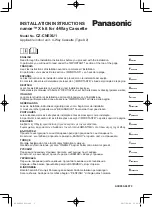
SAVE THESE INSTRUCTIONS!
Important Safety Information
READ AND FOLLOW ALL SAFETY INSTRUCTIONS
Labeling
Equipment shall be labeled stating that it has been
decommissioned and emptied of refrigerant. The
label shall be dated and signed. Ensure that there
are labels on the equipment stating the equipment
contains fl ammable refrigerant.
Recovery
When removing refrigerant from a system, either for
servicing or decommissioning, it is recommended
good practice that all refrigerants are removed
safely.
When transferring refrigerant into cylinders, ensure
that only appropriate refrigerant recovers cylinders
are employed. Ensure that the correct number of
cylinders for holding the total system charge are
available. All cylinders to be used are designed
for the recovered refrigerant and labeled for that
refrigerant, i.e. special cylinders for the recovery
of refrigerant. Cylinders shall be complete with
pressure relief valve and associated shut-off valves
in good working order. Empty recovery cylinders
are evacuated and, if possible, cooled before
recovery occurs.
The recovery equipment shall be in good working
order with a set of instructions concerning the
equipment that is at hand and shall be suitable for
the recovery of fl ammable refrigerants. In addition,
a set of calibrated weighing scales shall be
available and in good working order. Hoses shall
be complete with leak-free disconnect couplings
and in good condition. Before using the recovery
machine, check that is it in satisfactory working
order, has been properly maintained and that any
associated electrical components are sealed to
prevent ignition in the event of a refrigerant leak.
Consult the manufacturer if in doubt.
The recovered refrigerant shall be returned to the
refrigerant supplier in the correct recovery cylinder
and the relevant waste transfer note shall be
arranged. Do not mix refrigerants in recovery units
and especially not in cylinders. If compressors or
compressor oils are to be removed, ensure that they
have been evacuated to an acceptable level to make
certain that fl ammable refrigerant does not remain
within the lubricant. The evacuation process shall be
carried out prior to returning the compressor to the
suppliers. Only electric heating to the compressor
body shall be employed to accelerate this process.
When oil is drained form a system, it shall be
carried out safely.
AIRFLOW MEASUREMENT
Important: When testing or measuring airfl ow
in Canada, an airfl ow measurement adaptor is
required.
An adapter is needed to connect to airfl ow
measuring devices in order to measure both the
condenser inlet and outlet airfl ows during testing.
Contact Danby at 1-800-263-2629 to request an
adapter for testing.
All images are for instructional purposes only. The
actual shape may be slightly different.
1. Check the adapter for damage. If it is damaged
in any way, do not use it for testing. Contact
Danby for a replacement.
2. Attach the adapter to the duct as shown in fi gure
1 by inserting the clips on the duct into the
channel on the adapter.
3. Seal the seam between the adapter and the
duct.
4. Seal all seams between the adapter and the test
fi xture(s).
5. Adhere thermocouples to the hose equally
spaced along the line shown in fi gure 2 across
the length of the hose. Four thermocouples per
line. Note, the duct pictured in fi gure 2 is for
instructional purposes only. The actual duct will
look different when extended.










































